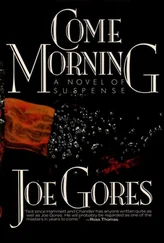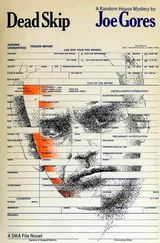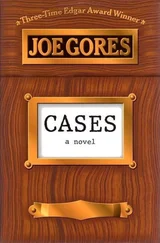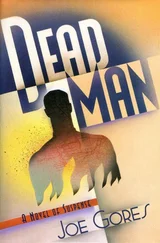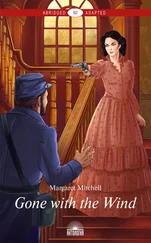The fat boy disappeared. Kearny shook out a cigarette, offered the pack to O’B. They lit up. The vacuum stopped. A very buxom woman wearing an apron came to the door. She had reddish hair and a face which was jolly the way a pig’s face is jolly. The eyes were pig’s eyes, also. O’B moved forward with his ready charm.
“We’re from the Apartment House Protective Association,” he said, coining a phrase. “We carry the fire and liability on the apartment complex on Avenue Fifty where your son Tommy was—”
“If they claim Tommy tore up that apartment...”
“Quite the opposite, Mrs. deSouza. When Tommy left there he apparently overlooked a substantial cashier’s check, made out to cash, in the dresser drawer. Mrs. Johnson held it the thirty days prescribed by law, then brought it to us. Naturally—”
“How much is it for?” she demanded quickly.
“Your son can tell us that to establish ownership.”
“I can take it for him...”
“We can only give it to your son direct, after he gives us a Hold Harmless letter,” rumbled Kearny, moving in. “Now, if we could just have his current residence address...”
It was not yet dark enough for headlights when O’B brought the LTD off the San Diego freeway at Wilshire and turned right into Veteran Avenue. They found a narrow concrete alley that started as an access road to a Bank of America drive-in window, then changed its mind to bisect a pocket of small, neat California ranch-styles at Fort Point Street. Houses from just after the war, getting a little seedy despite their aluminum sashes and sliding patio doors.
“With the double garage,” said Kearny.
O’B stopped in front of the open overhead door. Inside was a jumble of old lawn furniture, a freezer and a busted trike, a power lathe and a jigsaw wearing naps of sawdust. A back-wall door was open to show a little barefoot girl teasing a scruffy puppy with long floppy ears. A woman in old-fashioned pedal-pushers, pushing forty in a crudely handsome way, came through the door. “It’s Saturday, Hank is napping. You guys want a game, go—”
“Want Jeff Simson,” said O’B.
She gestured indifferently out the open door past the little girl. “The bungalow out back.” With the mileage showing in her eyes, Kearny wondered what sort of game Hank dealt. “You boys don’t look the type.”
“Closet,” explained O’B.
“Simson’s home, his roommate just left in tears a while ago. They had such a spat.”
The bungalow was a frame building which probably had been bootlegged as a rental unit in the postwar days before tightened building codes. Shrubbery masked the windows, but lights went on inside just as they got to the door. Kearny knocked. It was jerked open and Simson stared out into the dusk. A long set of parallel fingernail scratches decorated his left cheek. “Tommy, if you think—”
“Hello, Jeff.” Kearny pushed by him into the living room. It was obviously rented furnished, mostly to UCLA students.
“Hey, wha... oh. Mr. Kearny...”
O’B slid in behind Simson and shut the door and leaned back against it, thus becoming a jailer. Kearny paused in mid-room. “We want to talk with you, Jeff.”
Simson was much straighter-looking, except for the clawed cheek, than when his sexual preference had still been in the closet. Or the bus depot men’s room. “Talk about what? I want to warn you, I now am studying to be an attorney, so if you think—”
“An attorney? Terrif!” exclaimed Kearny warmly.
He walked over to the formica breakfast table, pulled out a tube-steel and plastic chair, and sat down. Simson was still on his feet, a wary look on his face. O’B walked by him and took a chair across from Kearny, who kicked back the chair between. Still wary, Simson very slowly lowered himself into it.
“If you’re studying law,” said Kearny, “you know the sort of trouble DKA could be in on this licensing flap.”
“I understand the attorney general’s boys have been around talking to you about it,” said O’B.
“Me? N... Nobody’s, uh... said anything about...” He essayed a watery smile. “Uh... what’s it all about?”
Kearny told him with the economy of thousands of field reports written during three-plus decades in the manhunting game.
“Well, uh, yes, I was in the office that evening, but—”
“Who else?” demanded Kearny.
“Who... uh... Kathy. And... uh... the man. The subject.”
O’Bannon was taking notes. He looked up, felt-tip in hand. “Pivarski?”
“Yes. Him.”
“Just the three of you?” asked Kearny. “What about Kelly?”
Sweat sheened Simson’s face. “She was in the outer office. On the switchboard.”
“What did Pivarski say when he gave Kathy the money?”
“Say? How am I supposed to remember?”
“Cash? Money order? Personal check?”
“Cash. It was cash I took to the bank.”
“Nothing unusual about the transaction, then,” said O’B.
“Just a normal collection,” agreed Simson eagerly.
Kearny nodded and beamed, as if entirely happy with Simson’s answers. “Five minutes for you to say that at the hearing on Monday, Jeff, and that will be that. Our treat on expenses, of course.”
“The hearing?” Consternation showed in his face. “But I can’t testify at the—”
“Why not? What you’ve been telling us is your best recollection of the truth, isn’t it?”
“Sure, but...” His words suddenly tumbled out very fast. “But I’ve got classes that day. I’ll do anything I can to help you guys out, but I just can’t miss my Monday classes.”
“We can sure understand that, Jeff,” said Kearny in sympathy. He snapped at O’B. “Give him a couple sheets of paper and that felt-tip, O’B. He can write up his statement in his own hand, just as he gave it to us, and sign it, and we’ll be on our way.”
“Hey, I didn’t mean—”
O’Bannon had shoved pen and paper under his nose.
“In your own words,” said Kearny, “just as you remember it.”
Kearny’s massive jaw was underlit by the red glow of the dashboard lighter he was bringing up to the tip of his cigarette. He turned right into Wilshire; his usual L.A. motel, the Del Capri, was a short mile away.
“He obviously never heard of that attorney letter Pivarski is supposed to have gotten Kathy to sign,” said O’Bannon.
“Which explains why the State was around talking with him.”
“I don’t follow that.”
“The State isn’t going to want him testifying as to what’s in this statement.” Kearny patted his breast pocket. “Just a routine collection and all of that. I bet they told him to stay lost.”
“Then why’d he give us the statement?”
“He’s weak,” said Kearny indifferently. “He was more scared of us, here now, than of the State last week. I sure hope Larry gets hold of Rose Kelly, and she has something to help us out.” He laughed mirthlessly. “Can you imagine what a sharp attorney would do to this guy on cross-examination if anyone was hard-up enough to put him on the stand?”
Ballard woke on Sunday morning in a motel in Eureka on California’s great northern redwood coast, population 24,337 and falling, due to the decline of the logging industry. He woke with somebody’s used sweat sock in his mouth and all five fingers of his right hand rammed into somebody’s monstrous gooey eye.
“Help!” he yelled, jerking upright in bed.
Then he relaxed. The sweat sock was his tongue, courtesy of Jack Gunne, the listed reference in the Rose Kelly file. Gunne hadn’t been at his Second Street address, which turned out to be a skid-row bar. Gunne was due back today. The gooey eye he was now licking off his fingers belonged to the Colonel: a lemon-whipped cream tart he had been too full to eat after downing the Colonel’s Extra Crispy 5-piece Jumbo Dinner the night before.
Читать дальше
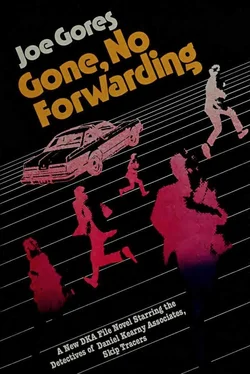


![Эрик Рассел - Подарок дядюшки Джо [=Подарок от Джо] (ёфицировано)](/books/65161/erik-rassel-podarok-dyadyushki-dzho-podarok-ot-dzho-thumb.webp)



